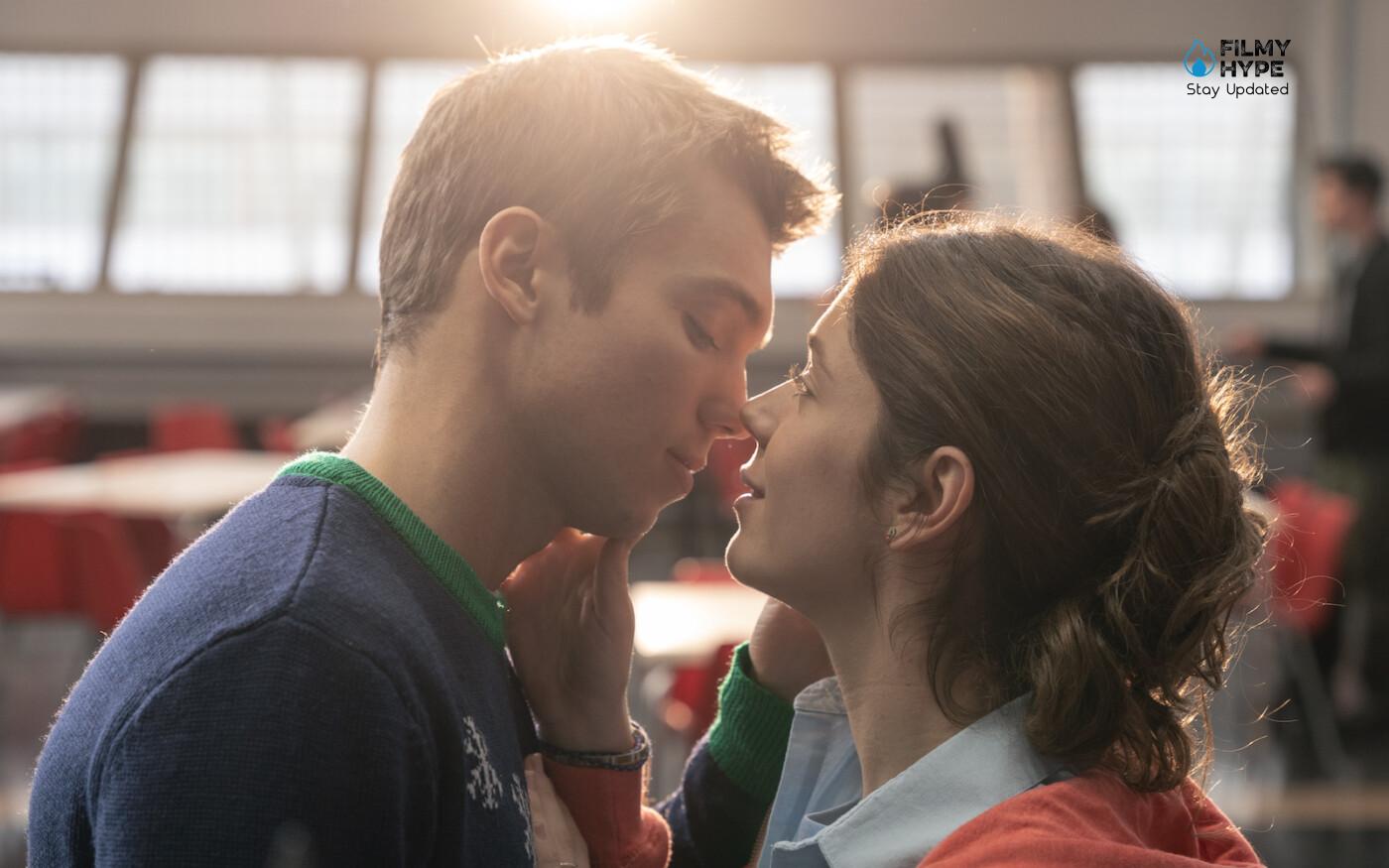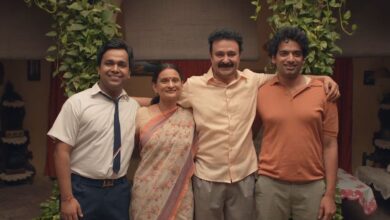In Love All Over Again Review: Love Story Without Particular Time Limits | Todas las veces que nos enamoramos
The review of Todas las veces que nos enamoramos, Netflix TV series from the creator of Elite starring Georgina Amorós.
Cast: Georgina Amorós, Franco Masini, Alberto Salazar, Carlos Gonzalez, Blanca Martínez, Roser Vilajosana
Creator: Carlos Montero
Streaming Platform: Netflix
Filmyhype.com Ratings: 3/5 (three stars)
On Valentine’s Day, the series In Love All Over Again (Todas las veces que nos enamoramos) arrives on Netflix, the project created by the creator of Elite convinces more by talking about friendship than love; here is our review. The creator of Elite returns to work for Netflix with the new series In Love All Over Again, a project with a romantic spirit that will try to exploit the Valentine’s Day climate to attract viewers’ attention. The project, which combines the traditional story of a couple who must face numerous obstacles with a fascinating setting such as that of the world of cinema, had excellent potential on paper which, as we will try to explain in our review, was not exploited in the best possible way of ways. After the success of Élite and The Mess You Leave Behind, Carlos Montero puts aside the thriller genre and dramatic tone to return with a romantic (and very promiscuous) TV series, which arrives on Netflix just in time for Valentine’s Day.

To In Love, All Over Again follows – moving on two timelines, 2003 and 2022 – the vicissitudes of Irene (Georgina Amorós), an aspiring director who moves from Castellón to Madrid to attend film school and realize her dream of her. I dream that she will be put to the test several times, both by external events (such as the Madrid attacks in 2004) and by meeting Julio (Franco Masini), a charming boy with a profound fragility with whom she will establish a passionate and fluctuating relationship. In our review of To All the Boys, We’ve Been in Love, we obviously won’t reveal whether the two boys will eventually be able to be together. But we can tell you that it is a TV series that is about love and friendship, but also the university years, the difficulty of finding one’s place in the world and what is t, and he “dark side” of cinema. Too bad for the somewhat trivial and repetitive screenplay, especially in the continuous push and pull between the two protagonists.
In Love All Over Again Review: The Story Plot
Irene (Georgina Amorós) is an aspiring director who moves from Castellón to Madrid to attend film school. Here she meets Damián (Carlos González) and Jimena (Blanca Martínez), with whom she starts sharing an apartment in Tetuán and tries her hand at producing a short film. Irene leads an ordinary university life until, on the occasion of a tragic event (the Madrid attacks of 11 March 2004), she runs into Julio, a charming but fragile boy who is studying to become a lawyer. Their first meeting will only be the beginning of a troubled and fluctuating story, in which the two boys continue to take and leave each other, argue and make peace, while Irene tries to pursue her dreams and Julio finds himself confronted – not without difficulty – with an unexpected and sudden career as an actor. The narrative, which moves on two different timelines (2003/2004 and the present day) follows the protagonists and their friends between love gimmicks, sex, and first work experiences as they try to find their place in the world.
In Love All Over Again Review and Analysis
The Spanish series created for Netflix moves on two narrative levels: the traditional love story hindered by various elements and the behind-the-scenes representation of the world of cinema. The two elements intertwine, at least initially, quite well, but gradually move away from reality, becoming more and more representations marked by clichés and stereotypes. The most convincing aspect of the first season, considering that the continuation of the story seems almost obvious after the cliffhanger with which the story ends, is the relationship between the young film students, the way friendships develop, and their attempts to make a short film, a project that from their perspective becomes a potential gateway to more prestigious productions and situations.
The interactions between Irene, Da, and Jimena are full of irony, simplicity, and that good dose of optimism and hope that distinguishes twenty-somethings who try to follow their dreams, even those too big for them. The moments spent in the classroom, the amusing moments on the set where everyone takes their first steps, and the dynamic that leads them to help and support each other infuse In Love All Over Again with warmth and sympathy. The world of cinema is certainly one of the main themes of the series. In Love All Over Again, Carlos Montero tells what life is like – far from home – for a group of students from the film faculty, describing their university routine, living together, their first projects, their frustration at not being able to bring what’s inside to the screen.
A universe told with extreme realism, which takes its cue from what was the true youthful experience of its creator. But the latter also shows us another side of the world of cinema, the darker and more “toxic” one. We see it in the story of one of the protagonists of the show, Julio, who, in a short time, finds a promising acting career in his hands. We see the boy, charming but deeply fragile and insecure, chasing a success that, little by little, end up devouring him, due to his inner demons and a world – that of cinema – which seems to have chosen him more for his fine appearance than for his actual acting skills. The abuses of power, the too-high expectations of others, and the complete distrust in himself will eventually lead the boy towards a spiral of alcohol and drugs from which – perhaps – only Irene will be able to save him.
It certainly cannot be said that the series created by Carlos Montero shines for its originality. The central theme of the narrative, or the impossible love between the two protagonists, is one of the most used and abused when it comes to the comedy genre. The two seem to recur in an endless succession of events and misunderstandings that throw a spanner in the works of a story that, perhaps simply, would not make sense to exist. A push and pull that, in the long run, inevitably ends up tiring, above all because it is always repeated with the same dynamics and is never interspersed with big twists. To revive the fortunes of the show are the moments of the daily life of the group of friends/housemates and the very frequent sexual messes that take place within the walls of the house.
Being a series created by Carlos Montero, someone from the cast of Élite certainly could not be missing. This is the protagonist Georgina Amorós who, in the famous Spanish show, played the role of Cayetana Grajera Pando. The co-star Franco Masini, on the other hand, is an Argentine actor and composer known for his role in the TV series Rebelde, also available on Netflix. Despite the good work of the two interpreters, it is not easy to become attached to their characters because – probably in the name of realism – they are characterized by behaviors that certainly do not make them two positive figures: they are both incoherent, immature and prone to betrayal, as well as having nothing to talk about outside the sheets. More sympathetic in their naivety are instead the two roommates of Irene, Damián, and Jimena – played by Carlos González and Blanca Martínez – who offer some amusing distraction from the continuous push and pull of the two main characters.
In Love All Over Again Review: The Last Words
In Love All Over Again is a TV series that talks about love and friendship, but also about the university years, the difficulty of finding one’s place in the world and what is the “dark side” of cinema. Too bad for the somewhat trivial and repetitive screenplay, especially in the continuous push and pull between the two protagonists. The presence of Da and Jimena instills joy and emotion in the all too predictable and traditional sentimental dilemmas that characterize Irene’s story. With an ending that lays the foundations for a second season, all that remains is to hope for a more honest and less stereotypical continuation of relationships and emotions, more in line with the maturity that should have been reached by the protagonists in some stages of the story.







